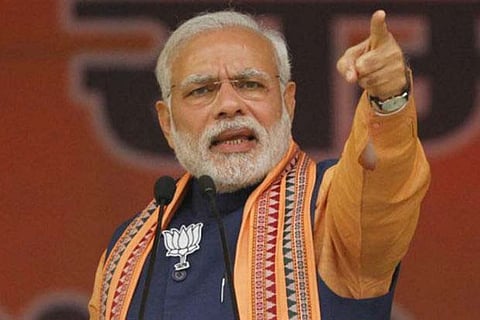

Chennai
The notion of privatisation is a touchy subject as far as India is concerned. A vestige of Nehruvian politics, the idea of state-owned enterprises that were kick-started to lift India out of penury post the British Raj, and propel it into the age of industrialisation, has often met with criticism on account of service levels. In what seems like the proverbial equivalent of taking the bull by the horns, Prime Minister Narendra Modi has set forth a rigorous agenda for privatisation in India. Reiterating that the NDA government was looking forward to privatising all PSUs barring four strategic sectors, namely atomic energy, space and defence; telecommunications and transport; power, petroleum, coal, and other minerals; and banking, insurance, and financial services; the PM said the government would maintain a minimal presence in these strategic sectors.
The PM’s assurances seem to be timed at an opportune moment, as India is already reeling from a massive backlog of loss-making PSUs that need the public’s money, placing an additional burden on the exchequer. Throw in a pandemic, and the diminishing returns on the job front, with as many as 41 lakh youths in India losing their sources of income, and it becomes extremely clear, why we as a country may not be in a position to sustain sick units with the tax payers’ money. To put the quantum of losses generated by PSUs into perspective, consider the following enterprises. Air India, which once prided itself as India’s national carrier, has sustained losses of Rs 27,255 cr in the FY 2016-2020. During the same period, telecommunications behemoth, BSNL/MTNL racked up losses totalling Rs 62,725 cr. It’s worth recalling that both these companies fall under the strategic transportation and telecommunications sectors, respectively. Modi’s initial plan involves monetising as many as 100 under-utilised or unutilised assets with PSUs, like those in the oil and gas, and power sectors, and creating investment opportunities worth Rs 2.5 lakh cr.
The government has currently set its sights on firms including BPCL, which happens to be India’s second-largest oil firm; Shipping Corporation of India Ltd; IDBI Bank, Pawan Hans (the helicopter services company); and Container Corporation of India. The plan to sell off the government stake from these companies, starting on April 1, from the next fiscal year is estimated to cough up at least Rs 1.75 lakh cr. The country’s largest disinvestment drive will also witness an IPO being held for Life Insurance Corporation of India (LIC), a company for which the government has literally run out of lifelines. Throw in the sale of two PSBs and a general insurance company, and the stage could be set for one of the largest financial disruptions witnessed in recent times. On paper, the proposals for asset monetisation towards funding developmental projects seem encouraging. But one only has to go by India’s track record, vis-a-vis sale of PSUs to understand how painfully long-drawn and riddled with bureaucratic bottlenecks, the process can be.
There are also other arguments to be made against the distress sale of India’s public assets. The government’s plan to privatise might also sound a death knell for millions of Indians hailing from economically underprivileged sections for whom PSUs might have offered a ray of hope, thanks to reservation-based employment prospects. That segment risks being further marginalised in the absence of PSUs. There certainly is a need to free PSUs from the ramshackle of bureaucracy and labour union-induced hurdles. And while India’s private sector has amply demonstrated its proficiency in serving the public on the delivery of goods and services of a multifarious kind, an exercise such as privatisation must be carried out in a transparent and accountable manner.
Visit news.dtnext.in to explore our interactive epaper!
Download the DT Next app for more exciting features!
Click here for iOS
Click here for Android